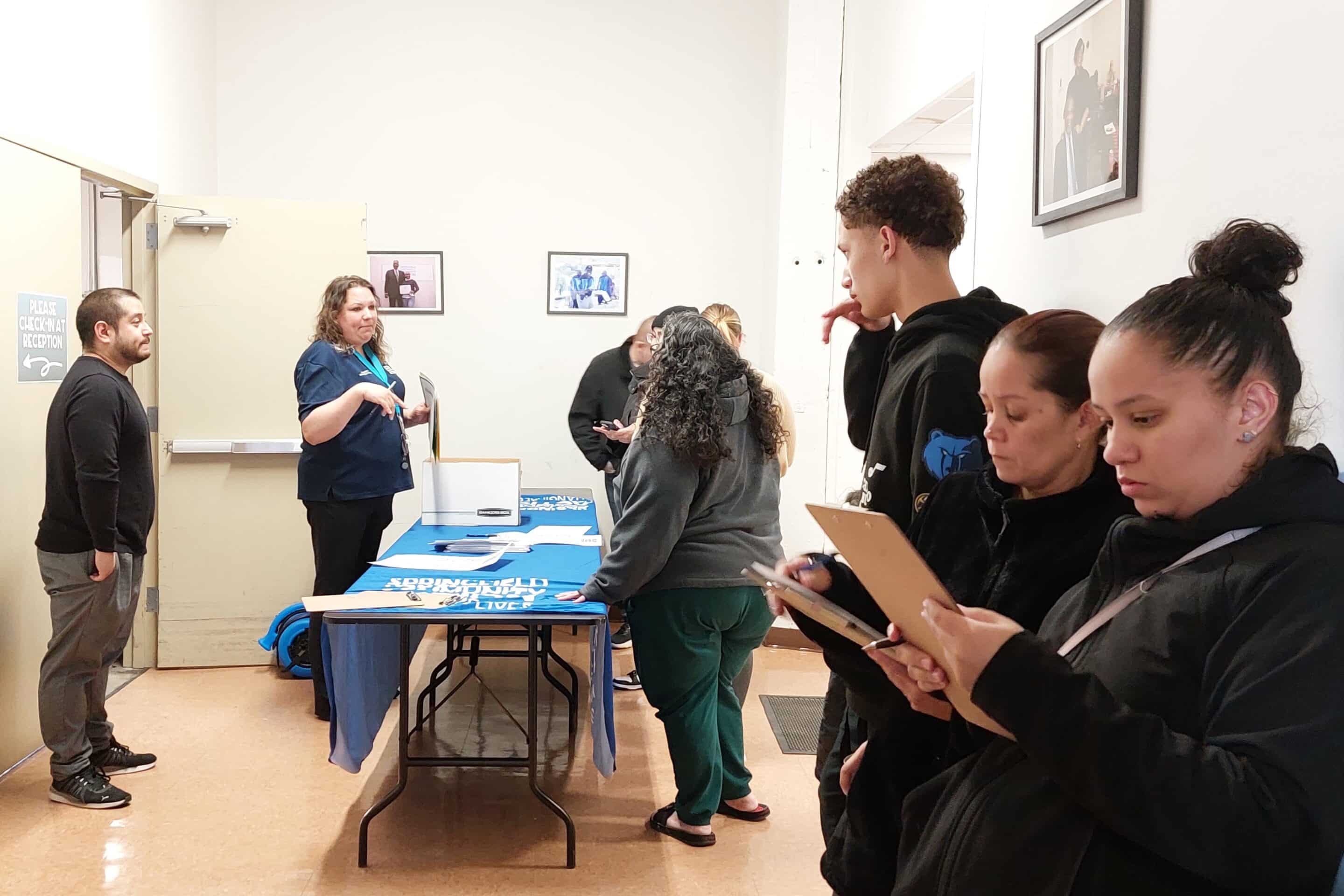People wait in line to receive diapers and wipes through a diaper distribution pilot program.
Reminder Publishing photo by Sarah Heinonen
SPRINGFIELD — On the second floor of 721 State St., a line stretched out of the door. People filled out forms while waiting, parents distracted toddlers when they got fussy and boxes full of diapers and baby wipes were continuously brought out from a room behind a table.
“Have you picked up before?” Tabitha Desplaines asked the woman at the front of the line. This was her first time. Desplaines called out to the families in line, “If you haven’t been here before, you have to fill out an intake form.”
Desplaines is the director of community services for Springfield Partners for Community Action, a nonprofit that offers employment support, financial services and education programs to low-income residents in an effort to fight poverty in the city. The diapers might be a key tool in that fight.
As a member of the Massachusetts Association for Community Action, Springfield Partners for Community Action is administering a pilot program from the federal Office of Community Services exploring the role of diaper access in poverty.
“Diapers are a safety net,” Desplaines said. “There’s a trickle effect. If you don’t have diapers, you can’t send [children] to daycare. If you can’t send them to daycare, you miss work. You might lose your job, then you lose your house.”
The Massachusetts Association for Community Action estimated that infants require up to 12 diapers per day. Meanwhile, the National Diaper Bank Network has reported that one-third of families cannot afford enough diapers for their children. Many of the programs that are available for low-income people, such as the Supplemental Nutrition Assistance Program and Women, Infants and Children, do not cover diapers.
The grant from the Office of Community Services funded the purchase of 3.5 million diapers, at a cost of $750,000. Springfield Partners for Community Action is one of 15 agencies tasked with distributing the diapers.
A total of 100 Springfield area children will be enrolled to receive diapers for 18-months. Parents must enroll in the program and self-certify their low-income financial status. Two surveys are completed at enrollment and a survey will need to be filled out again at the end of the program. The surveys collect data on whether participating families have trouble securing enough diapers for their children’s needs or have not been able to send their children to daycare because of a lack of diapers. There are also health questions about children developing infections or rashes from not being changed frequently enough due to rationing diapers. Desplaines confirmed that, while the surveys record participant demographics, they do not ask about residency status. The survey results from the start and end of the pilot will be compared to see if diaper access made a difference in family circumstances.
Desplaines said each child will receive about half the diapers they will need for a month to supplement what the family purchases. Participants pickup their allotment of diapers and wipes on the last Tuesday of the month. If a participant fails to pick up for two months, the participant can be removed from the pilot to make room for others.
When the pilot was first launched in October 2023, about 25 families responded, but several did not pick up consistently. Desplaines put the call out again, at daycare centers and on social media. This time, families of about 50 children responded, including Shakira Hernandez. She came to pick up for the first time with her 3-year-old and 5-month-old children.
“It will make a big difference,” Hernandez said of the program. A case of store brand diapers costs her up to $50, she said, and with two children in different sizes, she spends about $100 per month on diapers. “It’s not just the diapers, but the wipes” are also costly, she said. While she has been able to afford the cost “for now,” she has had to dip into savings accounts that she set up for each of the children.
Springfield Partners for Community Action is still accepting participants. Desplaines explained that even if the pilot is full, there will be a waitlist. She added, “Kids are going to age out, so add yourself to the waitlist.”
To enroll in the program or be added to the waitlist, call 413-263-6500.


